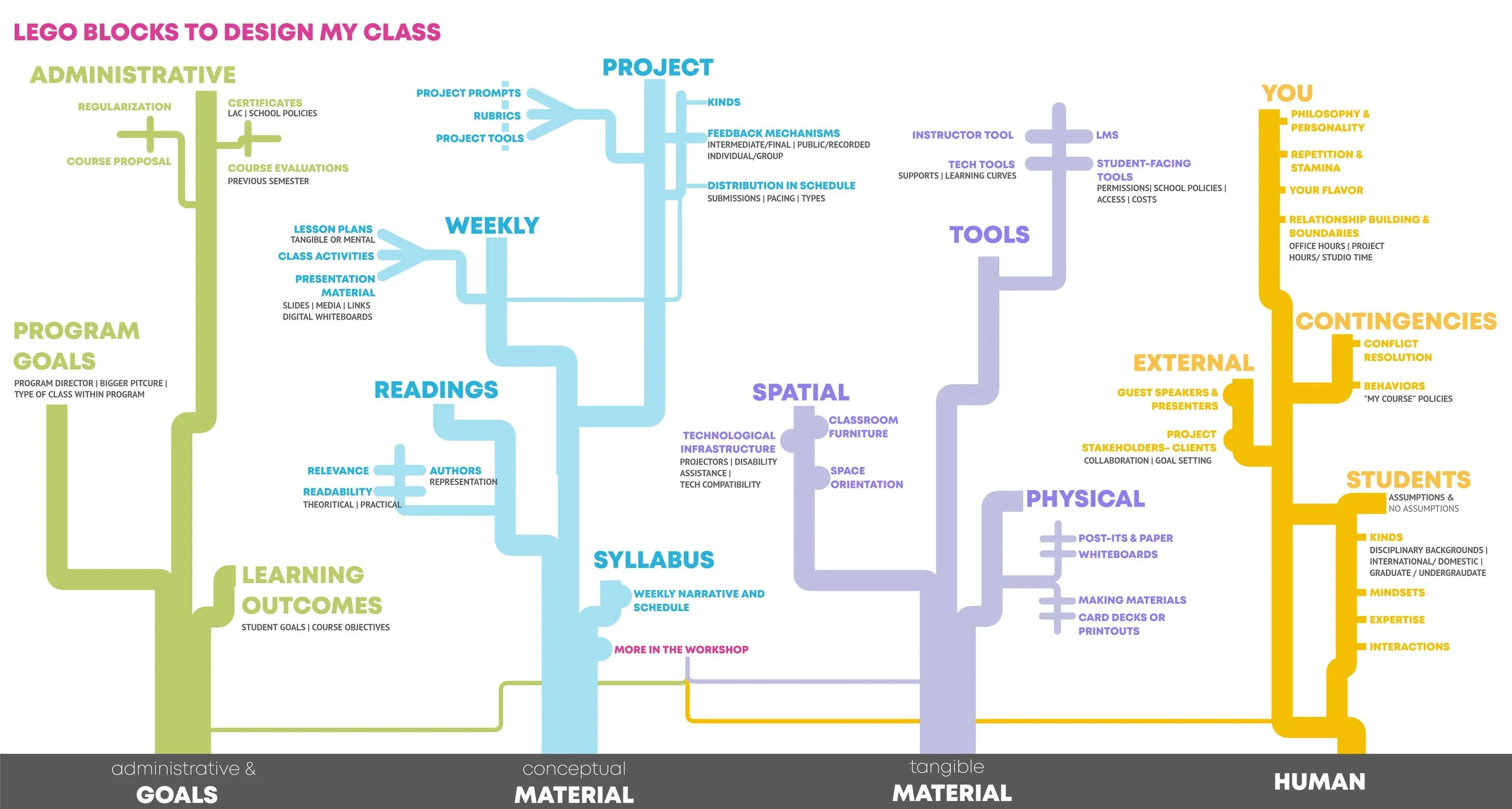My teaching interests range across
User Experience (UX) and Interaction Design , HCI and technology theory, emerging technology UX, service design, ethics and values, & qualitative research methods

*Primary Instructor and Course Designer of all these courses unless mentioned otherwise. *Student work links might sometimes not work as they are hosted sometimes on the students’ personal portfolio.
SU’25 | INFO 697- Deceptive Design and Ethical UX
This course explores the intersection of ethics, user experience, values, and design. Students will engage with real-world challenges to examine tensions between user needs and business goals, while identifying and addressing manipulative design practices; using ethics-focused methods.
SP’25 | INFO 624- Service Design [Syllabus]
This course will teach students the relationship and intersection of information, experience, service, and design. Students use hands-on mapping techniques, co-design, and other participatory approaches to develop and implement service blueprints, ecosystem loops, design interventions, and dynamic personas to design for both front stage and back stage.
FA, SU, SP’24 | INFO 636- Conversational UX Design [Syllabus]
This course will teach students topics related to designing, evaluating, and prototyping for conversational user experience (CUX) and interfaces (CUIs). Students will learn the state of the art and science of conversation design, explore the conversational design process, prototyping tools like Voiceflow, and reflect on the ethical implications of designing conversational agents.
Student Work: Sample 1 | Sample 2 | Sample 3 | Sample 4 | Sample 5FA, SP’24, & FA’23 | INFO 643- Information Architecture and Interaction Design [Syllabus]
This course provides students with practical knowledge and hands-on experience designing digital interfaces from a user-centered perspective through an exploration of the dual practices of information architecture and interaction design. **Core Course in Masters IXD program @Pratt.
FA’23 & 24 | INFO 601- Foundations of Information [Syllabus]
This foundational course focuses on the intersection of people, information, and technology and the theoretical and conceptual foundations of the information field. Students will be introduced to ideas and concepts that will inform future specializations in their course of study and provide them with concrete strategies for ongoing professional growth and development in their area of interest. **Core Course in Masters program @Pratt.
SP’2023 | INFO 694- Thesis/Project In Human-Computer Interaction (Part 2) [Syllabus] [Read more about the B.T.S]
FA’2022 | INFO 694- Thesis/Project In Human-Computer Interaction (Part 1) [Syllabus] [Read more about the B.T.S]
Thesis course marks the final year showcase of graduate student’s independent design projects, supported and mentored through the course. Students will apply their design learning as individual HCI/d practitioners; with scaffolds provided by the instructor.
FA’2022 | INFO 549- Advanced prototyping [Syllabus]
The course will cover issues surrounding the construction of prototypes (e.g., breadth, depth, look, interaction, low/high, vertical/horizontal, etc.). Students will practice manipulating different prototyping materials, both physical and digital, and learn about different prototype evaluation techniques; through project-based learning. Students learn a range of prototyping techniques and tools including Voiceflow, Makey-Makey, Micro-bits, IFTTT.
SP’22,23 | INFO 543- (UX) Interaction Design Methods [Syllabus]
This course aims to provide a foundation for understanding, choosing, and doing human-computer interaction (HCI) design methods. Students learn about various methods designers can use and learn for user research, analysis, designing, prototyping, testing, etc.; through project-based learning. **Core Course in Masters HCI/d program @IU.
SU’ 2022 | INFO 300- Human Centered Design and Development (Primary Instructor; Curriculum Designer) [Syllabus]
This course introduces students to the foundations of Human-Computer Interaction Design (HCI/d). This course aims to teach HCI/d students about design research/practice and various methods designers can use and learn for user research, analysis, designing, prototyping, testing, etc; through project-based learning.
FA’2021 | INFO 542- Foundations of HCI Theory (Co-Instructor; Assisted in Curriculum Redesign)
This course teaches foundational theories and history of HCI as a multi-disciplinary field. Students will learn the waves of HCI research and practice to conduct applicable turn points into their HCI/d practice. **Core Course in Masters HCI/d program @IU.
FA’2021 | INFO 541- Introduction to HCI/d Practice (Co-Instructor; Assisted in Curriculum Redesign; Stakeholder)
This course offers a holistic and practice-oriented introduction to Human-Computer Interaction Design. Through discussion and creative and reflective responses to a broad range of topics relating to HCI/d research and practice, participants will be introduced to different aspects of HCI and Design. Stakeholder for one of five projects to collaborate and guide ~20/74 students. **Core Course in Masters HCI/d program @IU.
SP’2019 | CGT 172- Studio 1: Fundamentals (Teaching Assistant)
Teaching Assistant for grading, providing student critiques, and class logistics (32 students).
courses
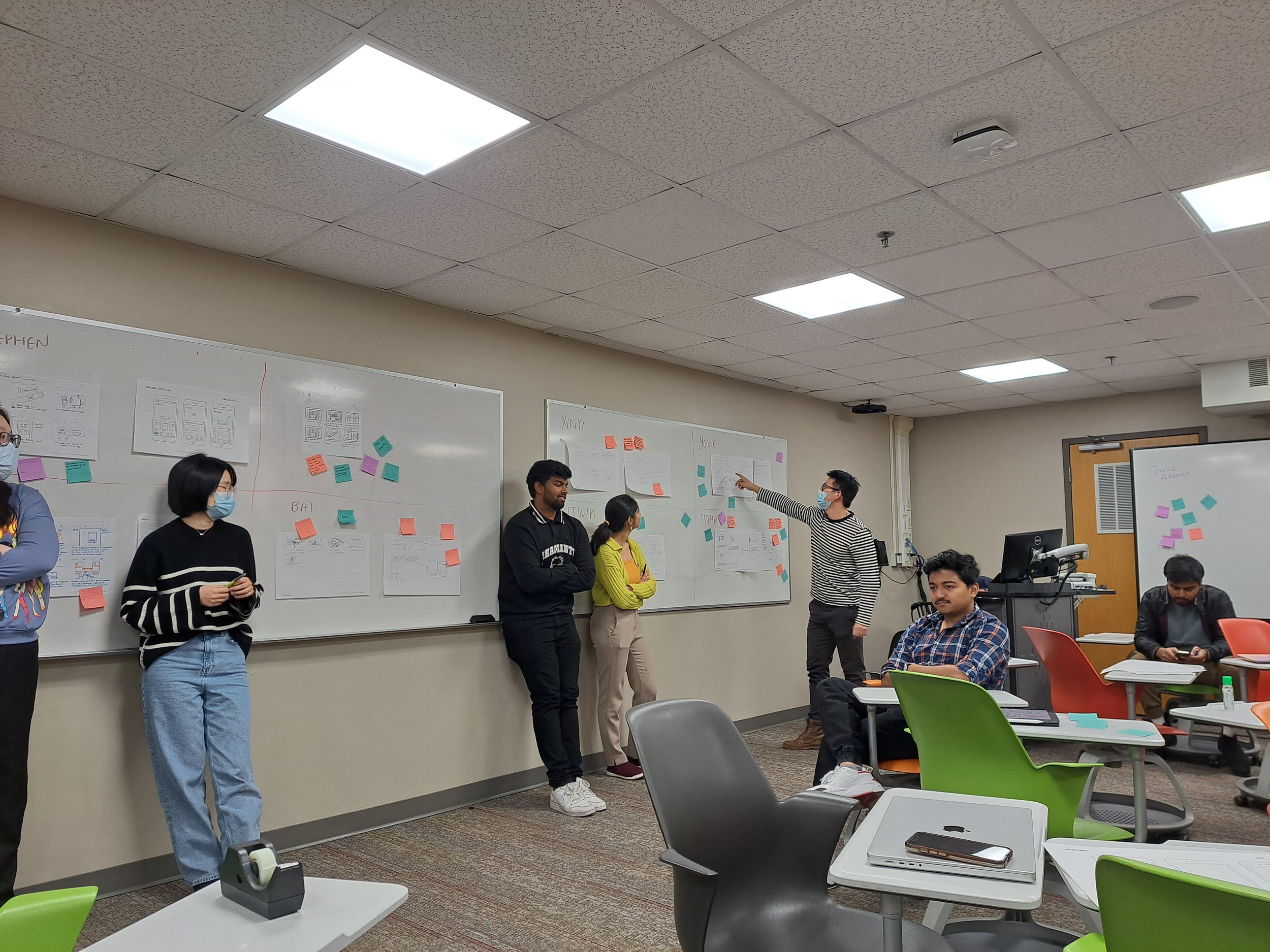

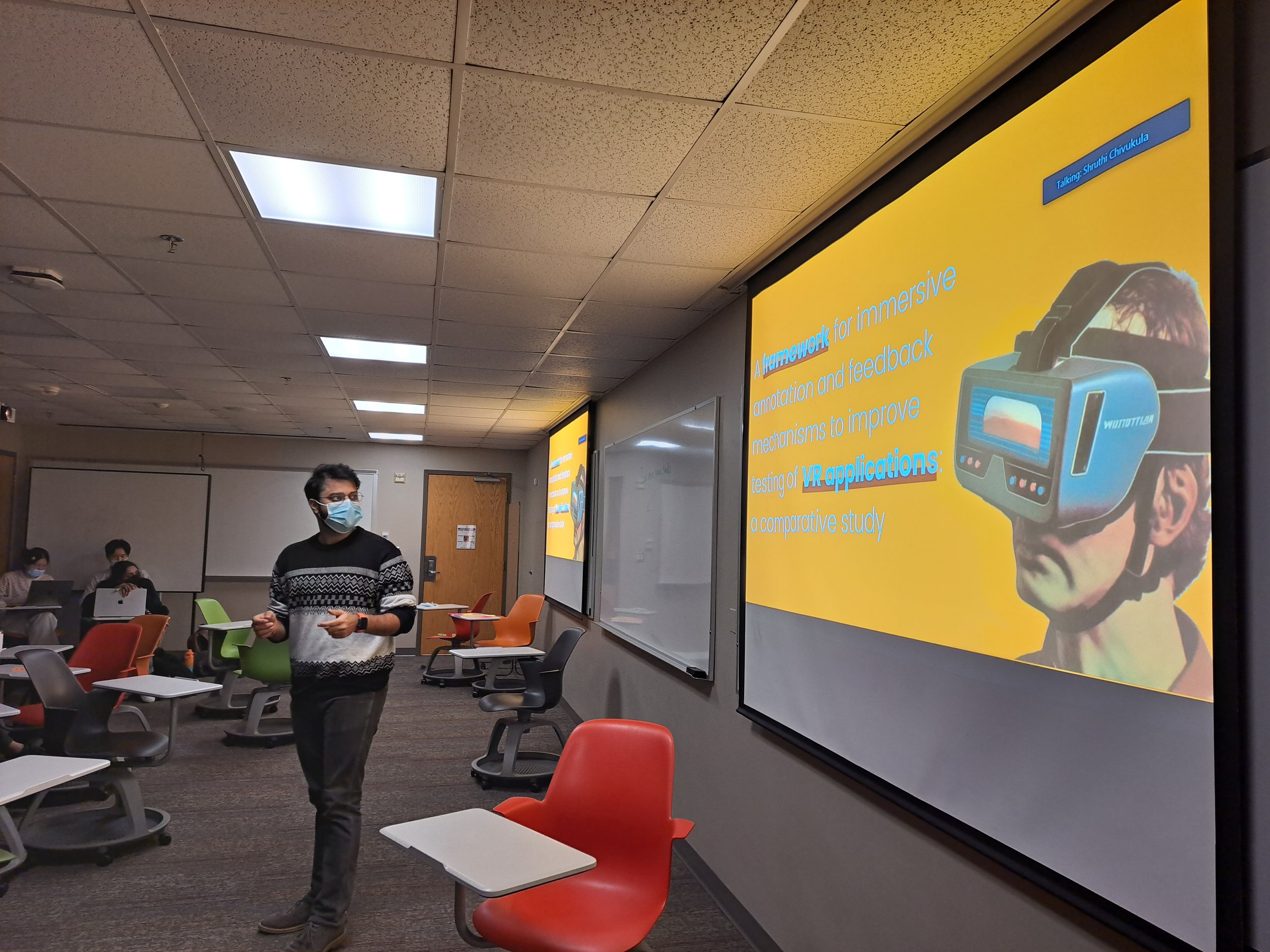





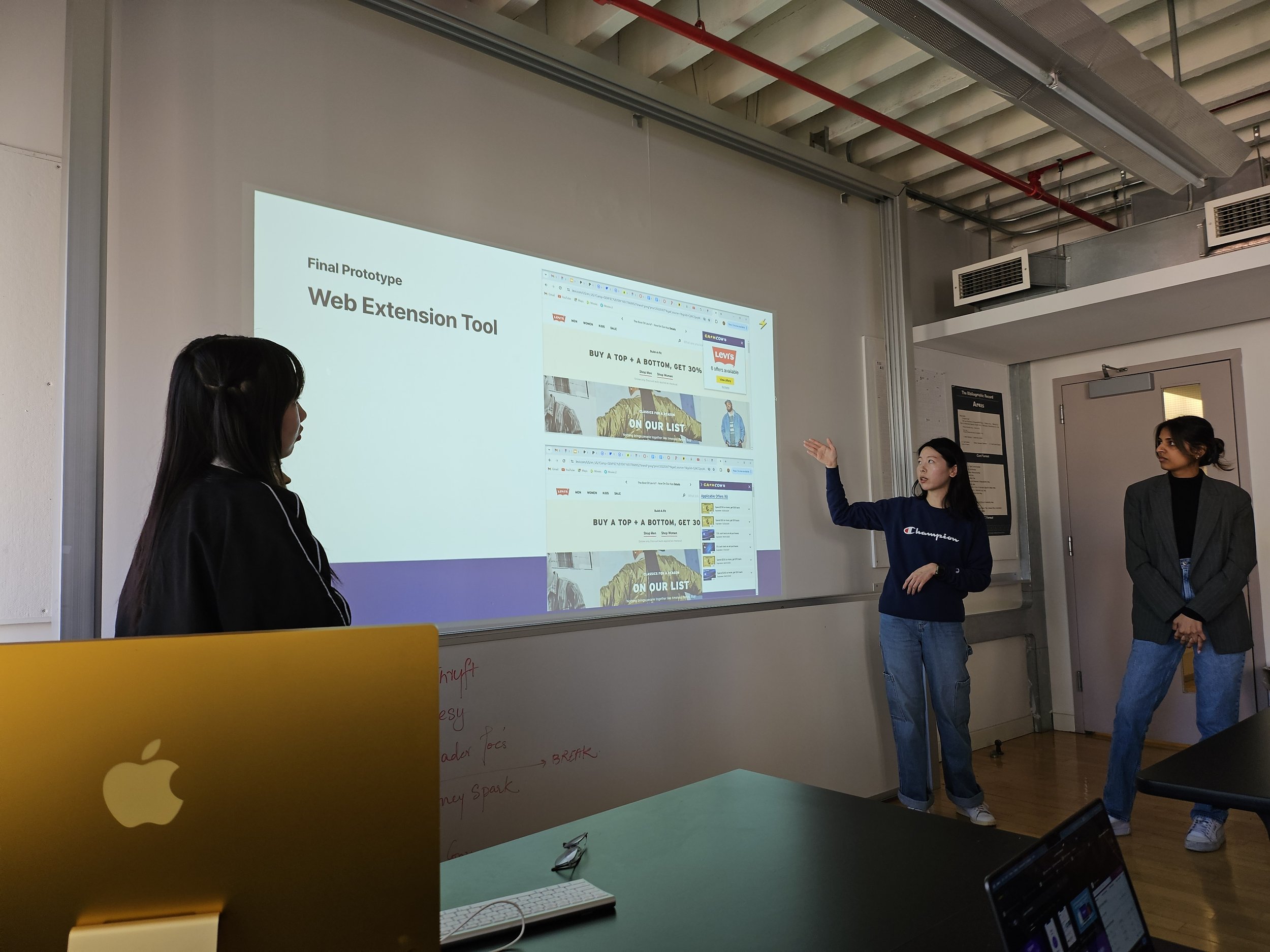
guest lectures
I696- Advanced Projects in Data Visualization (SP’2024,25; Pratt Institute)
Conducted an in-class workshop forData Analytics and Visualization Masters students about User Testing methods.I544- Experience Design (FA' 2021,22; Indiana University)
Gave a lecture to HCI/d Masters students about “Dark User Experience” and related concepts in Ethics in Design.Master Class (EduCHI @ CHI 2022 Conference)
Gave a master class to HCI educators and researchers on “Exploring Feminisms through Design in HCI Education” at the EduCHI Symposium at 2022 CHI Conference on Human Factors in Computing Systems. [slides, worksheet, miro]EDCI 616: Qualitative Research Methods (2020; Purdue University)
Facilitated a class to work through qualitative design before data collection phase. [lesson plan and worksheet]A&D 316: Seminar on Ideas on Industrial Design (2018; Purdue University)
Gave a lecture to Art and Design students about “Data Collection + Data Analysis” in UX design process. [material]

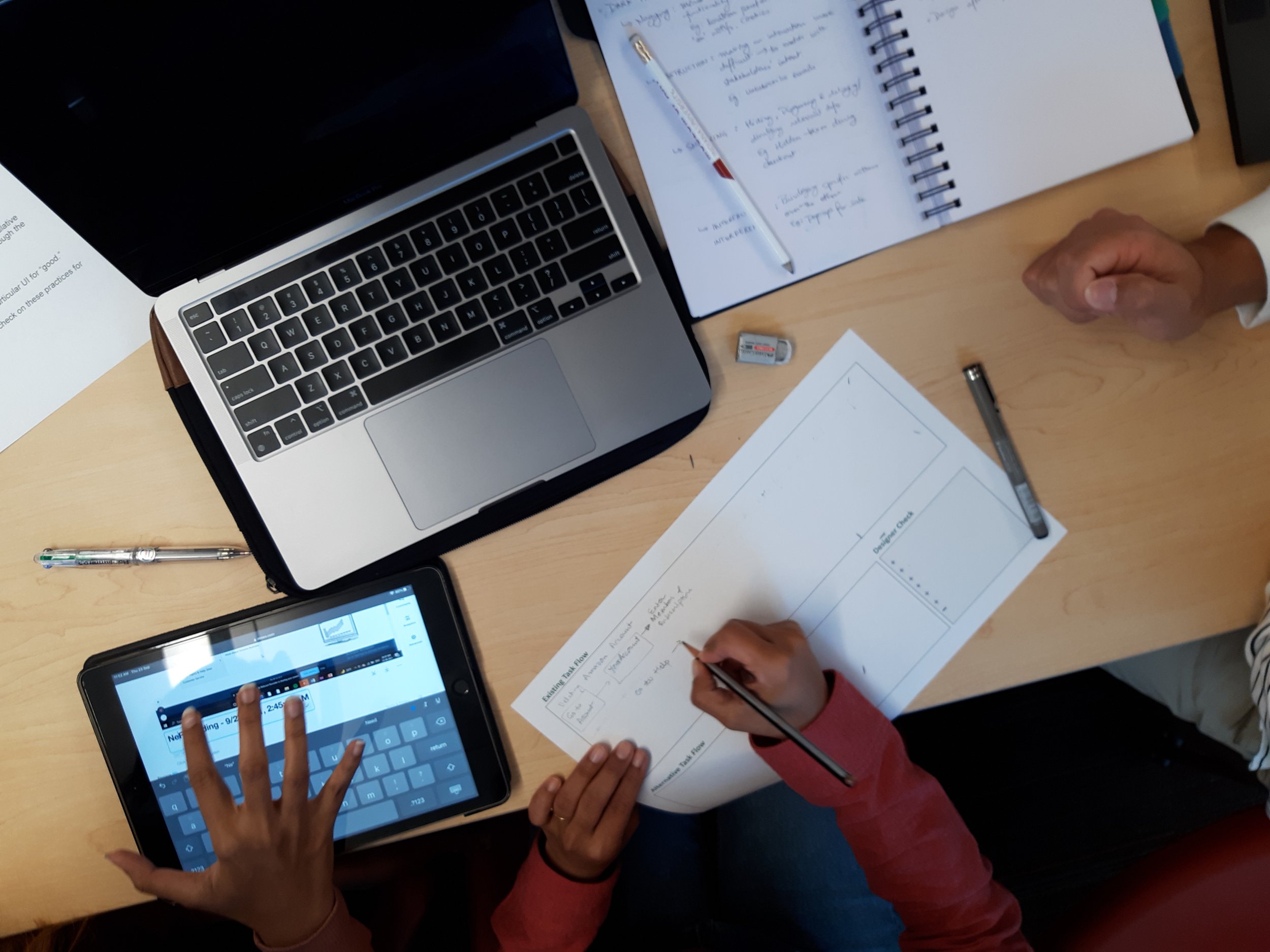

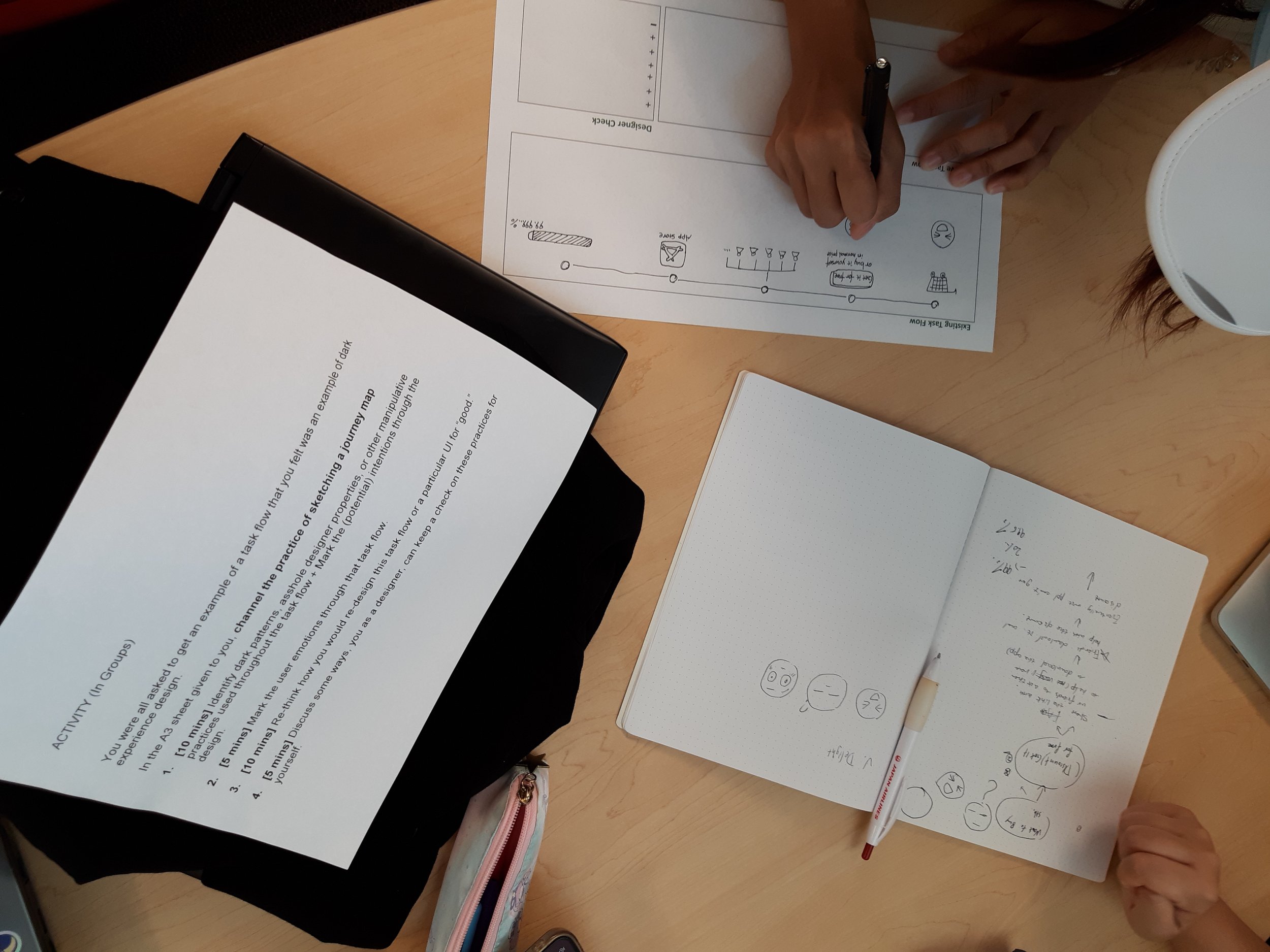






What do you need while designing for teaching?
(Talk presented in EduCHI’2025 Pedagogy Workshop)
UX Studio 1: Fundamentals
Spring’19
Teaching Assistant, Purdue Polytechnic School
Domain: User Experience Design
Role: Teaching assistant in giving feedback, grading and explaining concepts for fundamental course for UX design Undergrad major CGT 172 Studio 1: fundamentals.
This was a very fun experience for the first time teaching and assisting Dr. Colin M. Gray in teaching a studio of undergrads in their first semester and introduction to User Experience Design.
My role majorly included giving feedback on their design process, projects, guiding them through decision making and my little efforts to impart my design knowledge to unravel the clumsiness of becoming a designer. I learnt more than I taught and reflected how I was when I was in their position exactly eight years before (from when I was teaching).
teaching philosophy
My teaching philosophy is inspired by studio pedagogy, virtue ethics, and feminist values. Drawing from my User Experience (UX) Design education at Purdue University, I follow studio pedagogy [1] which engages students in collaborative projects, active learning, project-based learning, a sense of belonging, active reflection, and informal and formal critique sessions. I encourage students to think about multiple possibilities, system-level changes required, stereotypes to be disrupted, and social and emotional impacts of their work. Building on my research in ethics and values in technology design and experience, I challenge students to think about the manipulative and persuasive intentions embedded in their work and the political nature of technological artifacts being created, to build a more socially responsible design character. This aligns with the virtue ethical theory in how designers ---future technologists--- are the creators and guarantors who inscribe their own values and beliefs, along with professional competence, into designed artifacts. I will develop my curriculum to provide students with a mix of both theoretical (e.g., academic readings, book chapters) and practical (e.g., projects, hands-on assignments, reflections) knowledge. I recently also started practising how to encourage design failure as a form of learning and knowledge creation among students. I started to incorporate classroom activities where students fail in applying a theoretical concept as a strategy for knowledge-retention, of course in the right amounts, to feel comfortable with theory and practicing application of theories despite failing.
Drawing from feminist values, I provide a safe space for students to become emancipated, advocate for their own decisions, and respect multiple perspectives. I treat them as individuals with their own knowledge and lived experiences and often co-create knowledge with me in the classroom to learn, destructure, and critique design knowledge. I believe that knowledge sharing is a two-way process and it has to be nourished this way, elaborated in my ACM Interactions article on Feminism(s) in Design [2]. Given the nature of User Experience Design and HCI which draw from multiple disciplines, this pedagogical technique (although very investing and sometimes needs to be 100% present) helps support students from various backgrounds and make my teaching curriculum and environment inclusive. Additionally, I take student evaluations seriously to see how I can constantly iterate my curriculum and activities. I enjoy answering questions from undergraduate and graduate students as it helps me understand their mindset and helps me propose critical alternatives.
1. Boling E, Gray CM, Smith KM. Educating for design character in higher education: Challenges in studio pedagogy. DRS Conference Papers. 2020. doi:10.21606/drs.2020.120
pedagogical practices
These are some ways I activate my teaching philosophy and apply currently in my teaching practice:
Student Agency and Empowerment: I encourage co-creating knowledge in the classroom with students allowing them to build on their lived experiences and previous knowledge base. I provide avenues for students to share the co-created knowledge to also build a sense of community of knowledge (for example, in class content creation and “Presentation and Facilitation” exercises during INFO601 class). I do this to encourage students as their own bodies of knowledge and facilitate the process;
Pluralistic Engagements: I will develop my curriculum to provide students with a mix of both theoretical (e.g., academic readings, book chapters) and practical (e.g., projects, hands-on assignments, reflections) knowledge. I engage students in elements of surprise during their course time through multiple forms of informal (such as gallery walks, desk critiques) and formal (such as project documentation comments, prototype feedback annotations). I mostly engage in a range of submission types for students to have individual and group working environments;
Values-focused Reflection and Critique: I challenge students to think about the manipulative and persuasive intentions embedded in their work and the political nature of technological artifacts being created, to build a more socially responsible design character. I have also proposed and designed a specific course titled “Deceptive Design and Ethical UX” as inspired from research work.
Adaptive Pedagogies: I engage (more like, play) with pedagogical styles and tools based on the courses learning objectives and goals. For instance, I have deeply built on transformative pedagogical frameworks (“creates critical consciousness, agency, and change in the learner”; teaching inwards) while designing and teaching INFO697-Deceptive Design and Ethical UX; whereas employed a client-based project learning in INFO624-Service Design which would not be a choice for other courses I designed and taught. Adaptive Pedagogies change the teaching style, tools used in class, kinds of assignments for student outcomes, and rhythms in class.
Practice Alignment: I improve course curriculum to match the technological advancement in the market and allow students to prepare for industrial experience in a classroom setting; especially in my classes dealing with emerging technologies (i.e., INFO636-Conversational UX Design). I build project prompts inspired by tech industry projects, promote using prototyping tools used in industry (Voiceflow, Figma, XD, Protopie);
Student Involvement into Pedagogy Decisions: I open the space for students to involve in deciding elements (within the given framework) of their learning for the day or in the entire curriculum. I engage with students to reflect and assess learning objectives as a group in the classroom.
